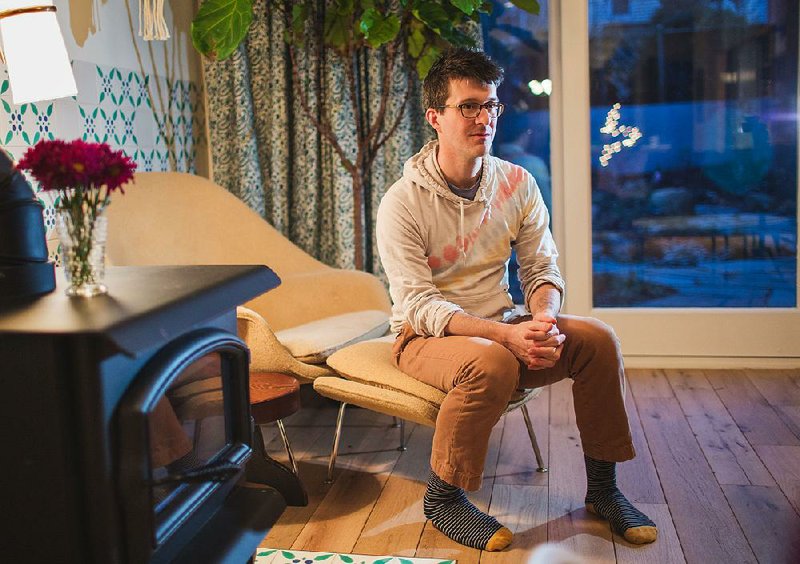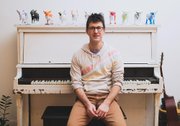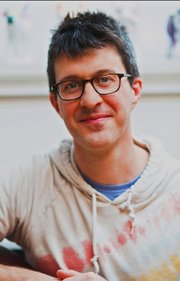BROOKLYN, N.Y. -- It's not that Christian Rudder is crass. He simply expects more of you.
"He has a 'people should be more enlightened and not be bothered by things' sort of attitude," says Clayton Smith, who has known Rudder, the president and co-founder of online dating site OkCupid, since their first day of seventh grade at Pulaski Heights Middle School.
Christian Rudder
Date and place of birth: Sept. 1, 1975, Little Rock
When I want to relax, I like to read the paper.
My favorite book: The Civil War: A Narrative by Shelby Foote
My favorite movie: Probably The Omen. I like movies about the Antichrist. There’s something ultra-spooky about it. There’s lots of people that believe the good side of the god/devil axis, so you have to also buy into the other half, right?
My favorite TV show: It’s Always Sunny in Philadelphia
My new year’s resolution: To be more positive
The best thing in my closet: The shoes I like are called Nike Meadows, and I’ve been getting them on eBay since I took my friend’s dad’s pair in ’91. But they’re gone. I think there are no more left. The pair that I have that’s all beaten up, it’s kind of like my last one.
One word to describe me: Persistent
In recent months Rudder, 39, has given dozens of interviews. He has spoken at The Atlantic Monthly's tech conference and at the headquarters of Google, Microsoft, Facebook and Pixar. During an interview for National Public Radio's On the Media, producer PJ Vogt grew so enraged that he began lobbing questions alongside the show's host.
"We're very nice but not particularly sensitive to people being offended," says Chris Coyne, 37, another OkCupid founder.
The controversy began shortly before the Crown Publishing Group released Rudder's book, Dataclysm: Who We Are When We Think No One's Looking (which sold for seven figures, according to Publisher's Weekly). It takes a chatty approach to data analysis, using information provided by 25 million online date seekers.
Among the findings: OkCupid users -- largely educated, urban, white twentysomethings -- claim openness to all ethnicities, but interracial messaging is rare. And men, regardless of age, prefer women in their early 20s. But it's Rudder's method, not his message, that has riled critics.
Dataclysm hit shelves in September. In late July, Rudder posted on his OkCupid blog for the first time in three years. "We Experiment on Human Beings!" it blared.
An article had revealed that Facebook skewed nearly 700,000 news feeds to discover how positive or negative posts affected users. Amid public outrage, Rudder outlined how OkCupid has used data in unexpected ways.
"If you use the Internet, you're the subject of hundreds of experiments at any given time, on every site," the OkTrends post reads.
Vogt was upset by an experiment Rudder calls "The Power of Suggestion," where OkCupid told badly matched users that they were good matches, to test the company's algorithm. Rudder found that good matches would message even if they thought they were bad matches, but bad matches were nearly as likely to message, if those users were told they were good matches.
"I know what we do isn't unethical," Rudder says. He thinks the On the Media staff acted manipulatively. "I talked to those dudes for 90 minutes, and they cut down to only the 10 most controversial minutes."
His wife, publicist and entrepreneur Reshma Patel, 37, pays more attention to Rudder's press than he does. "He sees the attention for what it is. It's always fleeting. ... I'll paraphrase or read out the highlights, and we kind of move on," she says.
Moving on is nothing new for Rudder. Before settling in Little Rock, his father's banking job took the family from Ohio to Mexico, Texas and Kentucky. Rudder left Little Rock for Harvard University, did a year as a math major, came home, then went back, switched his major to English and, in his senior year, took nine math classes. He graduated with a mathematics degree, after which he became a failed financial-software creator, a rock star, a husband, a multimillionaire and a father.
Rudder says there has never been a plan. "Taking risks is really important. ... If you see something that you want to do, really going all in on it, that's what's worked well for me."
ALL IN THE FAMILY
Plum Rudder is 3, and Rudder adores Plum even more than Plum adores Taylor Swift. "It's such a cliche, but having a kid makes you so much more sympathetic ... because you realize that everybody is somebody's kid," he says.
Rudder has never posted Plum's picture on the Internet. In fact, the man who made his fortune connecting people virtually (to the tune of 4 million users a month) deplores social media. He uses Facebook infrequently and started a Twitter account to tweet Dataclysm news. Neither he nor his three OkCupid co-founders have dated online.
Rudder met Patel in 1999, when his spazzy, keyboard-driven band, Depeche Mode (no relation to the British band), split the bill with her boyfriend's band. The two began dating in 2003, after moving to New York separately. They were both competitive and encouraged what Rudder calls an "impishness" in each other. Rudder introduced Patel to the role-playing game Magic the Gathering, and they threw a joint bachelor/bachelorette party with their friends teaming up against each other, field-day style, on relays, kickball and beer chugging.
Just out of college, Rudder and a friend created financial software that they attempted to sell to stockbrokers. "We sold our 40th one because I had been cold-calling people, and then we hired these two salesmen," Rudder says. "They milked us into oblivion. But I remember when we hired them, we thought we were legit. We were raising our High Life in cheers, like, 'Dude, we totally made it.'"
Five years later, Rudder co-founded his second company, OkCupid. In 2011, he and his co-founders sold the firm to IAC, the parent company of Match.com, for $90 million. That was when Rudder quit living paycheck to paycheck. He's not sure how his increased net worth has affected his outlook.
"Probably in ways I don't know. Probably my friends think I'm more of an a**," he says. (According to Smith, "He still acts the same.")
After OkCupid sold, the family moved from a one-bedroom apartment to a three-story row house with heated wooden floors. But they live in the same neighborhood, have the same friends, wear the same clothes and drive the aging van used by Rudder's band, Bishop Allen.
Rudder's parents are closer now, but that's because they wanted to be near their grandchild. A few years ago, they packed up their Hillcrest home and moved to Long Island.
"His family was always very Leave It to Beaver," Smith says. "Christian didn't get a driver's license until he was pushing 18. He had no problem being in high school with his mom driving him around."
DOT-COM BOOMER
Before OkCupid, there was The Spark, featuring SparkNotes (electronic study guides) and a humor component, designed to direct traffic to SparkNotes.
The Spark was the 1999 brainchild of four Harvard students, none of whom Rudder knew well. When he was hired, Rudder moved back to Massachusetts from Austin, Texas, where he and his band mate Justin Rice had followed a filmmaker friend, Andrew Bujalski. ("Andrew went there because he loved Richard Linklater. And we were like, 'Why not, we gotta live somewhere,'" Rice says.)
At first Rudder slept in a corner at The Spark's tiny offices. Then Rice moved back, and the two became roommates again -- an arrangement that would continue until 2005, when Rice moved in with his future wife.
At The Spark, Rudder created a pickup line generator and a prototype "match" test that eventually spawned OkCupid's match questions. And there were bigger endeavors, like Stinky Feet, where Rudder spent weeks tracking his purposely cultivated athlete's foot. (He ended up with cellulitis, antibiotics and online fans.)
"I'm definitely not a dirty person. I don't really like dumb jokes in person ... it was just like, what kind of stupid stunt can we pull?" Rudder says.
The Spark largely disappeared from the Internet in 2001, when Barnes & Noble bought SparkNotes for about $30 million. That sale provided seed money for OkCupid, launched in 2004 as one of the first free online dating sites.
By 2009, the company was sinking under a global recession and an unsuccessful international launch. To attract page views and, as a result, advertisers, Rudder started OkTrends, a statistics blog that became the germ of Dataclysm.
Coyne calls OkTrends "a turnaround for the company."
"The blog was this snowballing effect. ... At its peak, we would have over a million people reading it who weren't users," he says.
Rudder has a more modest take: "If the site hadn't have been good, publicizing it wouldn't have gone anywhere."
ON THE ROAD
Rudder met Rice in a college English class, but they became friends because they both went to see the power-punk band Jawbreaker and the next day Rice wore the T-shirt. Eventually they formed Depeche Mode and, in 1996, a punk trio called Pissed Officers (Rudder on guitar, Rice on bass) that Rice describes as "bursts of white noise."
"I thought we were writing really anthemic punk songs that sounded like Stiff Little Fingers or The Clash," Rice says. "But we'd play them as fast as we could, and we ended up with songs that topped out at about 30 seconds."
No one could understand them, so Pissed Officers passed out photocopied lyrics at shows, many of which were held in dining halls or the basement of the local health food co-op.
After Rudder graduated from Harvard in 1998, he and Rice moved to an apartment on Cambridge's Bishop Allen Drive, along with Bujalski (the filmmaker) and Jed McCaleb, Rudder's high school friend and the future founder of Mt. Gox, at one time the largest Bitcoin exchange.
"It was the kind of time where you'd be in Boston, and last call was called, and you'd be like f*** it, it's cold outside ... we can take a cab home or, for the same amount of money, we can go to New York," Rice says. (Back then, the Chinatown bus ran between the cities at $5 a pop.)
Around 2000, Rudder and Rice began making four-track recordings that sounded more pop than punk. They named the project Bishop Allen, after their old address. Much of their first album, 2003's Charm School, was written in rural Virginia, where they moved after The Spark sold. The idea was to live with Rudder's sister, in college there, and focus on music.
From 2003 through 2010, Bishop Allen was Rudder's primary income. He spent hours in vans, collaborating on crossword puzzles and reading pulp fiction aloud, alongside rotating members.
"We played a family Christmas party in Ohio where it was just some accountant that had heard us on NPR, and he brought us in. Everyone was wearing ugly Christmas sweaters and eating pigs in blankets, and we set all our stuff up on the landing on the stairs and nobody knew why we were there," Rice says.
In 2007 Bishop Allen was signed by independent label Dead Oceans and things got better. The band played international festivals and landed commercial contracts with Sony and Target, as well as an appearance in the 2008 movie Nick and Norah's Infinite Playlist. In 2014 the band released Lights Out, its fifth album.
AN OVERACHIEVING UNDERACHIEVER
"Who can forget Christian Rudder?" says Page Daniel, Rudder's Little Rock Central High School physics teacher. He recalls Rudder's science fair project, a machine that hit a tethered ball to measure if corked bats have an advantage over wooden bats.
Rudder, then a member of the Central High baseball team, has always been a fan of statistics. As a child, he spent hours in front of a rudimentary computer simulation, pushing the space bar and watching baseball stats pass.
"We had a clique of maybe three or four. ... We were definitely not 'glasses and pocket-protectors,' but we were not a popular crowd," Smith says.
Smith remembers skipping school often enough that "they tried to keep me from graduating senior year," he says. "The [Advanced Placement] European History teacher turned me in for skipping, but not Christian. ... He was the golden boy. Valedictorian, Quiz Bowl, that kind of thing."
Rudder was also an Eagle Scout and a Presidential Scholar. Even so, when he got to Harvard, he was overwhelmed. "I kind of coasted through high school," he says. "I thought I would do the same thing. Then I found out that was basically impossible."
He took a year off and moved with friends into a house across from the Arkansas Skatium. While his roommates took classes at the University of Arkansas at Little Rock, Rudder worked in his girlfriend's father's office. Most evenings, pre-college life resumed -- hours sacrificed to pickup basketball and West Coast punk.
They drove to Wisconsin a few times to play independent league three-on-three basketball. "It pretty much proved that practice doesn't make perfect, because I was awful. Christian wasn't very good either," Smith says.
But their friend James Lester played well and talked big. One time an opponent threw a punch, so Rudder came to Lester's defense, returning the punch. Then, in one smooth motion, Rudder pivoted and ran in the opposite direction.
Smith has it on video. "We always brought a camcorder, and the girlfriends of the other team were recording for us," he says. "They were saying, 'Oh my God, oh my God,' but they kept filming."
The next year, Rudder went back to Harvard.
TRIVIA
Rudder can quote Winston Churchill liberally. ("Once he went through a stage where he was just memorizing Winston Churchill speeches," Coyne says.)
While watching Cash Cab, Daniel was surprised to hear the name of his former student. (The show's premise is that unsuspecting taxi riders answer trivia for money and call one friend for help. "I want to call Christian Rudder," the contestant said.)
Rudder starred in Bujalski's 2002 film, Funny Ha Ha, which critics claim launched the mumblecore subgenre.
Multiple friends describe Rudder as someone who will always forget his wallet or lose keys in a snowy field. Other descriptors include "aggressively creative," complex, funny, thoughtful and smart. According to Rice, all of this is governed by underlying logic.
"Christian is a really good guitar player," Rice says. "Specifically, he's really good at playing really, really fast. ... Why he is so good at the guitar, I don't know. He's confident, decisive and athletic and therefore, good at the guitar. Which doesn't totally make sense until you know him, and suddenly all those things are connected."
High Profile on 02/15/2015



